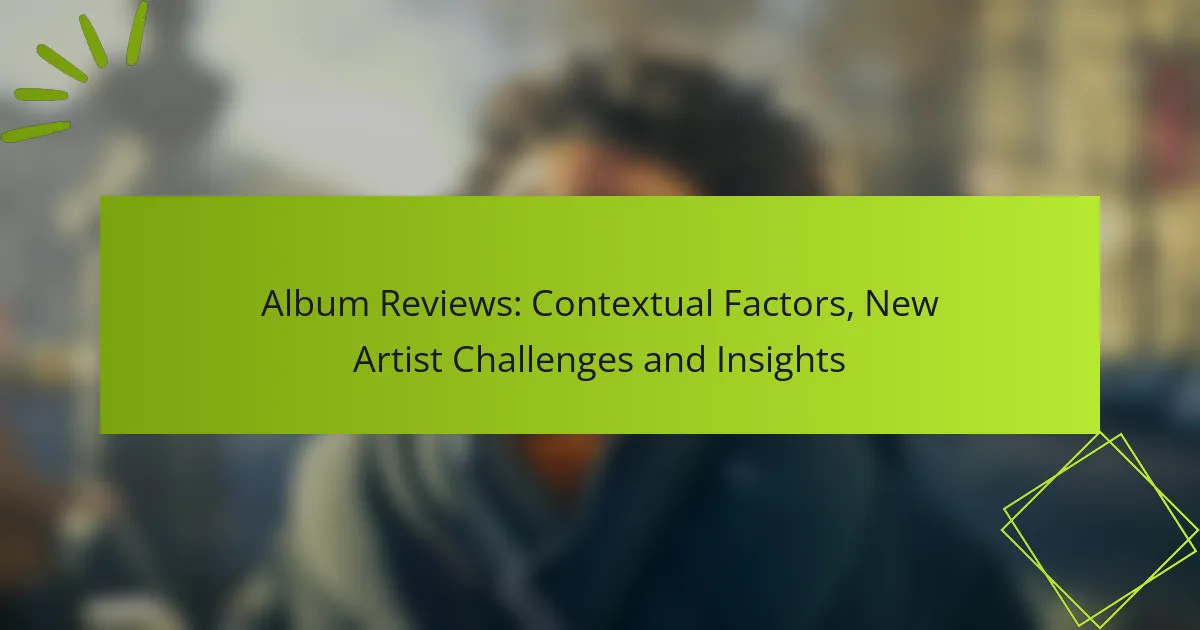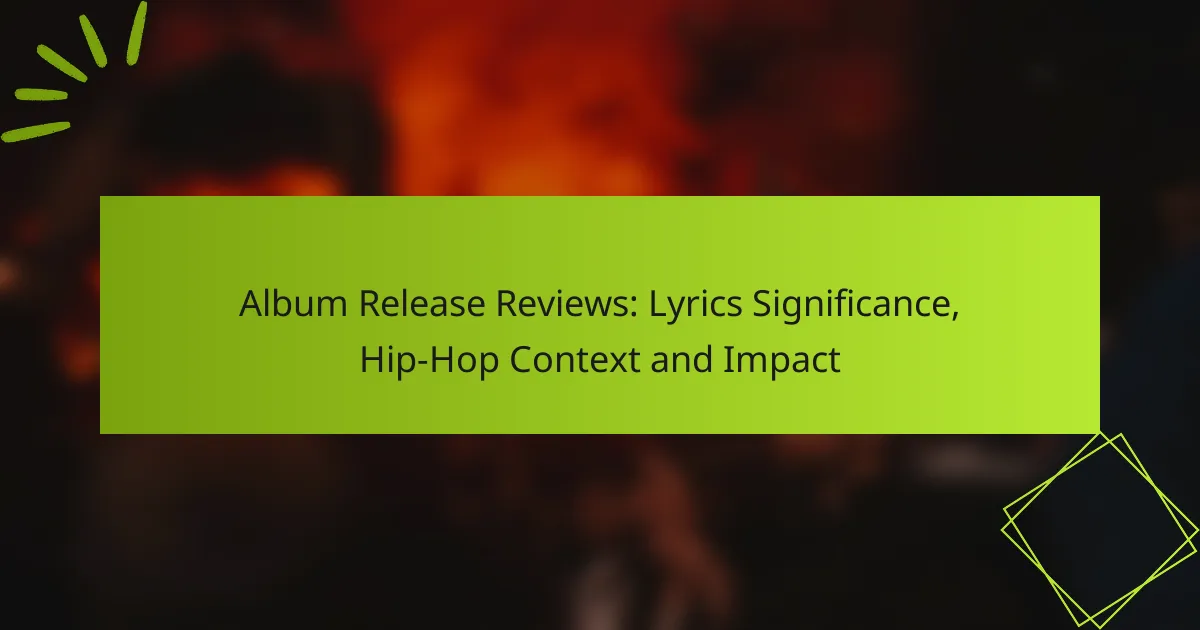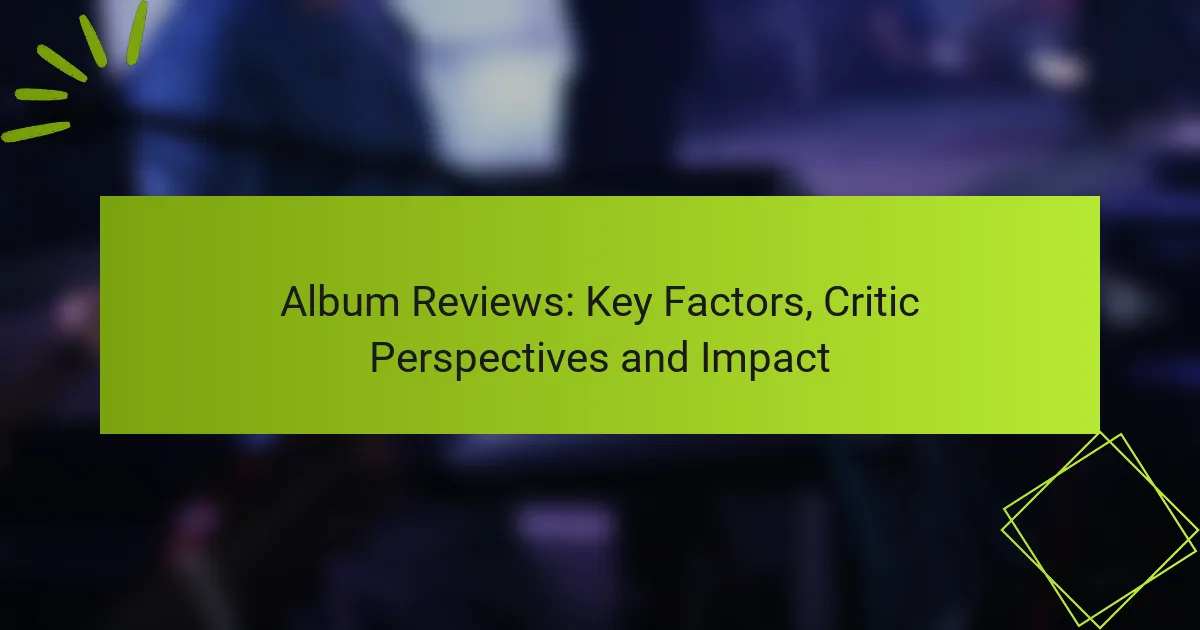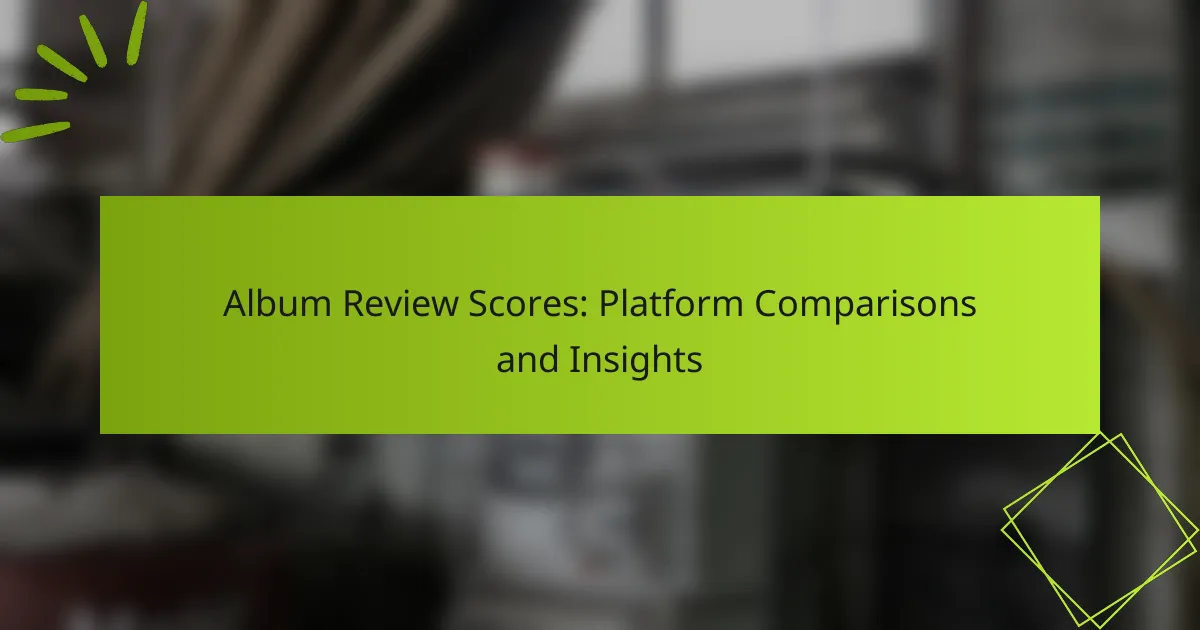Album reviews are profoundly influenced by contextual factors such as cultural trends and social media dynamics, which shape both critical and audience perceptions. For new artists, the challenge lies in overcoming limited visibility in a competitive industry, making it essential to engage with critics and utilize digital marketing strategies to enhance their presence and credibility.
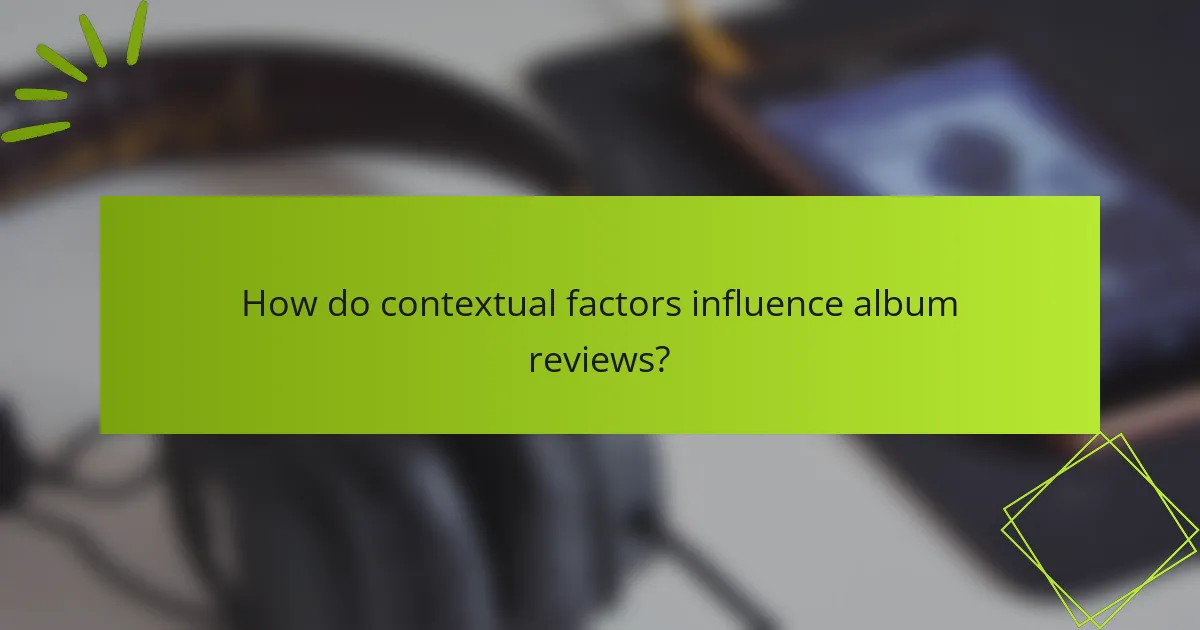
How do contextual factors influence album reviews?
Contextual factors significantly shape album reviews by affecting how critics and audiences perceive music. Elements such as cultural trends, social media presence, and industry standards play crucial roles in determining the reception and interpretation of an album.
Impact of cultural trends
Cultural trends can greatly influence album reviews by framing the context in which music is received. For example, an album that resonates with current social movements may receive more positive attention than one that does not align with prevailing sentiments. Critics often assess how well an artist captures or challenges these trends.
Additionally, genres that are currently popular can affect the expectations placed on new releases. For instance, an artist releasing a hip-hop album during a surge in the genre’s popularity may benefit from heightened interest and favorable reviews compared to a less trendy genre.
Role of social media
Social media serves as a powerful platform for shaping public opinion and influencing album reviews. Artists often use platforms like Instagram and Twitter to engage with fans, which can create a buzz around a release. Positive interactions and viral moments can lead to more favorable reviews as critics may feel pressured to align with popular sentiment.
However, social media can also amplify negative feedback quickly. A backlash against an artist or album can spread rapidly, potentially swaying reviewers to adopt a more critical stance. Critics need to navigate this landscape carefully, balancing popular opinion with their own assessments.
Influence of music industry standards
The music industry sets certain standards that can impact how albums are reviewed. These standards include production quality, marketing strategies, and distribution methods. An album that meets or exceeds these expectations is likely to receive better reviews, while those that fall short may be criticized for lacking professionalism.
Moreover, industry trends such as streaming dominance and the shift towards singles over albums can affect how critics evaluate a full-length release. Albums that successfully adapt to these changes, such as incorporating popular singles or innovative marketing campaigns, may be viewed more favorably in reviews.
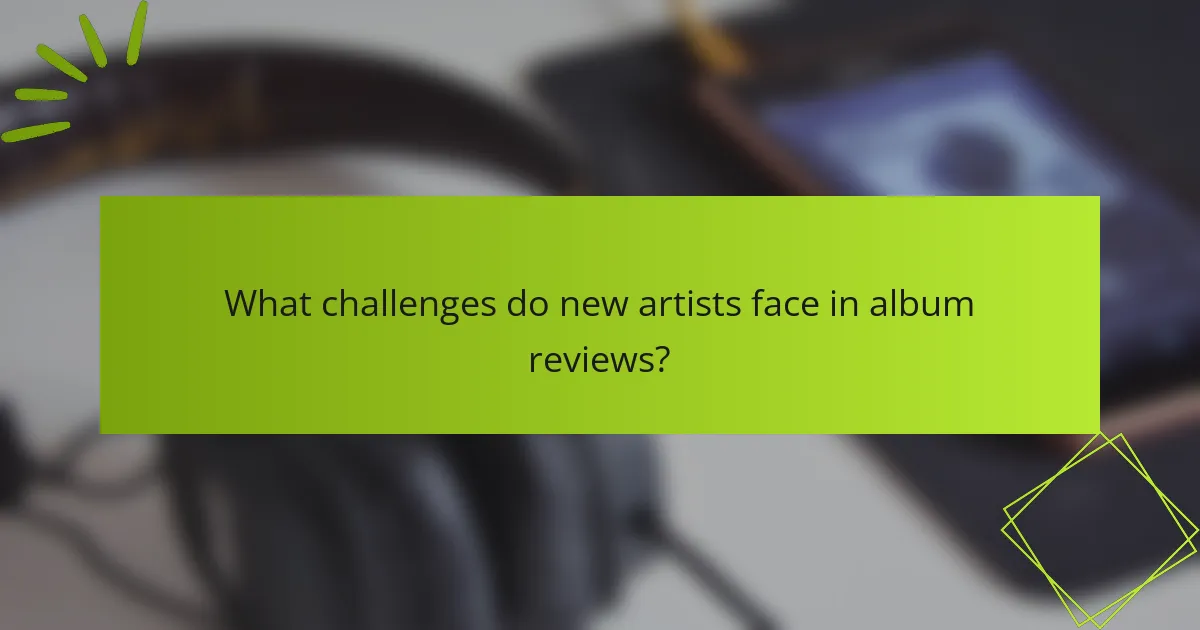
What challenges do new artists face in album reviews?
New artists encounter several significant challenges in album reviews, primarily stemming from their limited visibility and the competitive landscape. With fewer resources and less established reputations, they often struggle to gain the attention needed to make an impact.
Limited exposure and visibility
New artists frequently face limited exposure, making it difficult for their albums to reach a wide audience. Many rely on social media and streaming platforms to promote their work, but without a substantial following, their efforts can go unnoticed.
To enhance visibility, new artists should consider collaborating with influencers or established musicians. Engaging in local performances or using targeted advertising can also help attract attention and build an audience.
Competition with established artists
Established artists dominate the music scene, often overshadowing new talent. Major labels and well-known musicians have extensive marketing budgets and loyal fanbases, making it challenging for newcomers to break through.
New artists can differentiate themselves by developing a unique sound or aesthetic. Focusing on niche genres or themes may help them carve out a space in the market where they can compete more effectively.
Difficulty in building a fanbase
Building a fanbase is a critical hurdle for new artists, as they need to convert casual listeners into dedicated supporters. This process can take time and requires consistent engagement with potential fans through social media and live performances.
To foster a loyal following, new artists should interact with their audience regularly, share behind-the-scenes content, and create a sense of community. Offering exclusive content or merchandise can also incentivize fans to support their music actively.
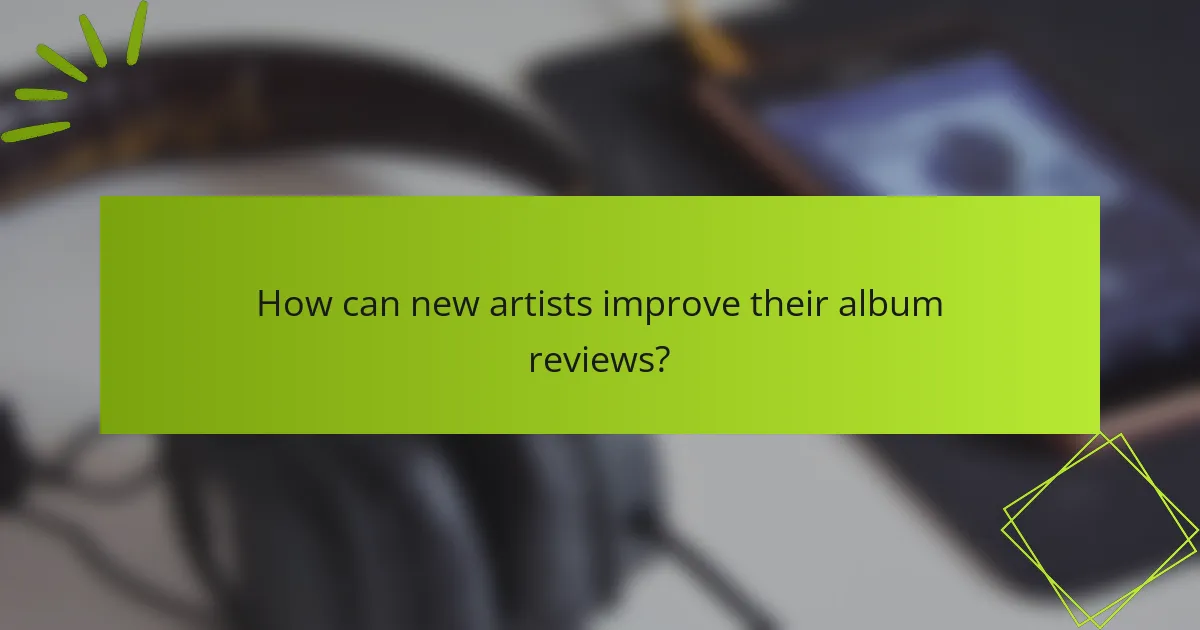
How can new artists improve their album reviews?
New artists can enhance their album reviews by actively engaging with music critics, leveraging digital marketing strategies, and collaborating with influencers. These approaches help build visibility and credibility, which are crucial for gaining positive feedback.
Engaging with music critics
Engaging with music critics involves reaching out to them directly to share your album and its story. Personalizing your communication can make a significant difference; instead of generic emails, tailor your message to each critic’s style and preferences.
Consider offering exclusive content, such as behind-the-scenes insights or early access to tracks. This not only piques their interest but also shows that you value their opinion, potentially leading to more thoughtful and favorable reviews.
Utilizing digital marketing strategies
Digital marketing strategies are essential for new artists to promote their albums effectively. Start by building a strong online presence through social media platforms like Instagram, TikTok, and Twitter, where you can share snippets of your music and engage with fans.
Investing in targeted ads can also help reach specific demographics that align with your music style. Utilize platforms like Facebook Ads or Google Ads to promote your album launch, ensuring your budget is allocated wisely for maximum impact.
Collaborating with influencers
Collaborating with influencers can significantly amplify your reach and credibility. Identify influencers in the music niche who resonate with your style and audience, and propose partnerships that align with both parties’ goals.
These collaborations can take various forms, such as sponsored posts, music reviews, or even joint live sessions. This not only introduces your music to their followers but also adds a layer of authenticity to your promotional efforts.
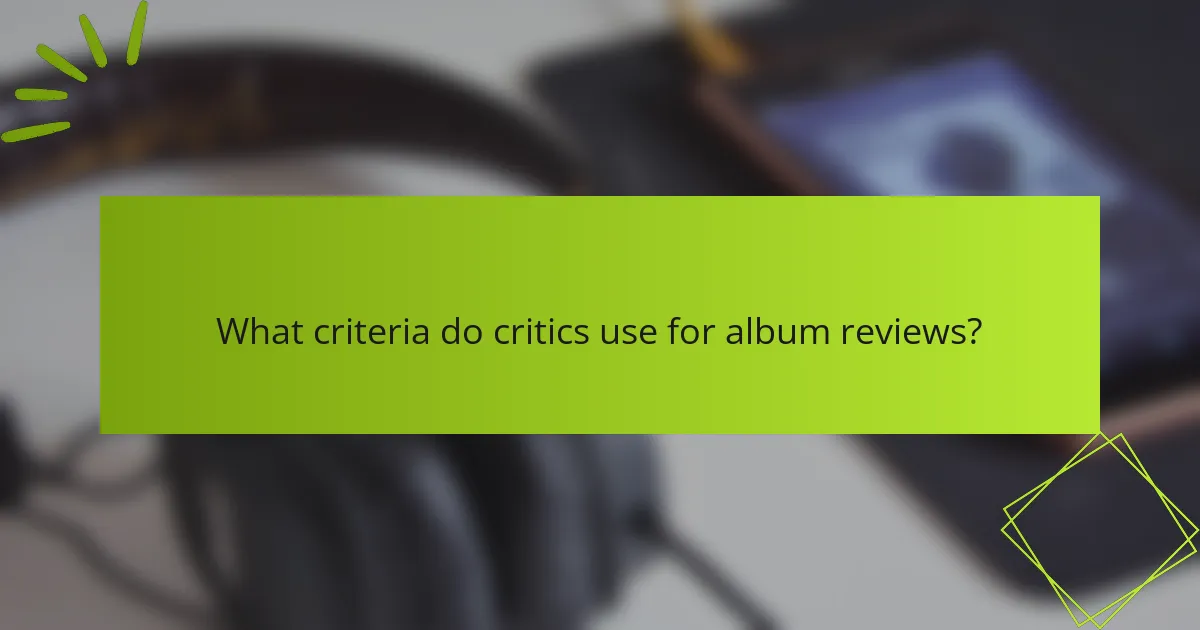
What criteria do critics use for album reviews?
Critics evaluate albums based on several key criteria, including musical composition, lyrical content, and the artist’s originality. These factors help determine the overall quality and impact of the album within the music landscape.
Musical composition and production quality
Musical composition refers to the arrangement of melodies, harmonies, and rhythms that create a song. Critics often assess how well these elements work together, looking for innovation and cohesion. Production quality is equally important, as it encompasses the technical aspects of recording, mixing, and mastering, which can significantly affect the listening experience.
For example, a well-produced album might feature clear vocals, balanced instrumentation, and a polished sound that enhances the music’s emotional impact. Critics may also consider the use of technology and instruments, noting how these choices contribute to the album’s overall aesthetic.
Lyrical content and themes
Lyrical content involves the words and messages conveyed in the songs. Critics analyze themes such as love, social issues, or personal struggles, assessing their depth and relevance. Strong lyrics often resonate with listeners, making them more memorable and impactful.
For instance, an album that tackles contemporary issues like mental health or climate change may be viewed more favorably due to its societal relevance. Critics often look for storytelling techniques and poetic devices that elevate the lyrics beyond surface-level meaning.
Artist’s originality and creativity
Originality and creativity are crucial for distinguishing an artist in a crowded market. Critics evaluate how unique an artist’s sound is compared to their peers and whether they bring fresh ideas to their genre. This can include innovative song structures, unexpected collaborations, or genre-blending techniques.
An artist who consistently pushes boundaries and experiments with new styles may receive higher praise. Critics often reward those who take risks and challenge conventions, as this can lead to groundbreaking work that influences future music trends.
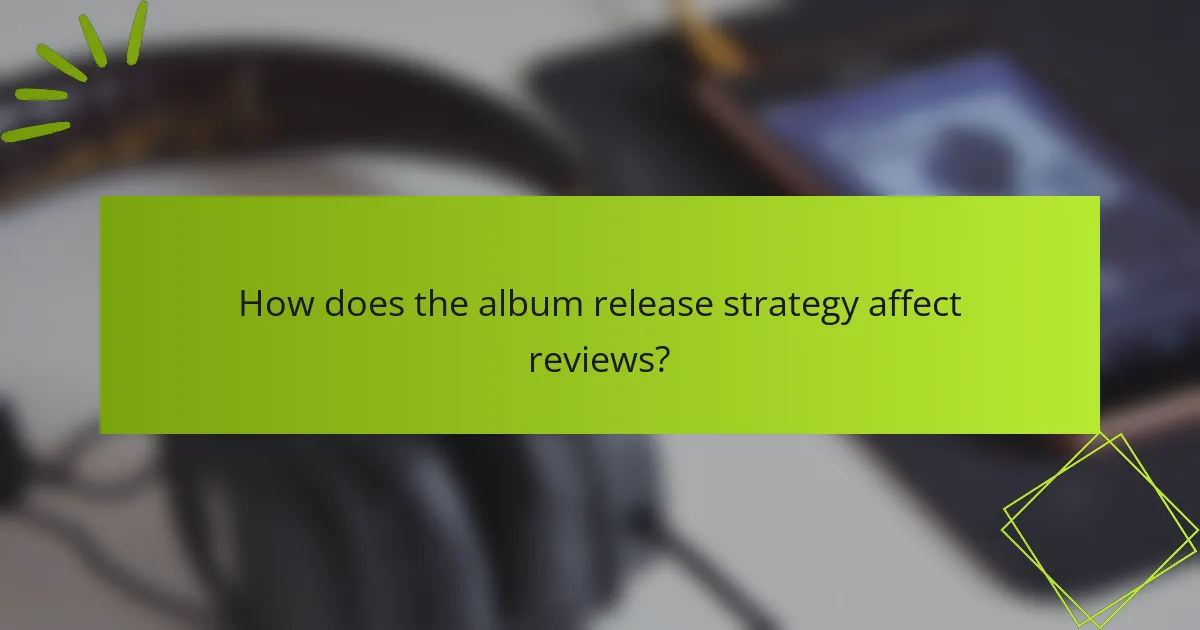
How does the album release strategy affect reviews?
The album release strategy significantly influences how critics and audiences perceive and review the music. Factors such as timing and promotional efforts can enhance visibility and shape initial impressions, ultimately impacting the overall reception of the album.
Timing of the release
The timing of an album’s release can greatly affect its reviews. Releasing during peak seasons, such as holidays or summer, can increase exposure, while launching during quieter months may result in less attention. For example, albums released in late November often benefit from holiday shopping, whereas those released in January might struggle to gain traction.
Additionally, aligning the release with significant events, such as music festivals or award shows, can create buzz and attract more reviews. Artists should consider the competitive landscape and avoid clashes with major releases from well-established artists.
Promotion and marketing efforts
Effective promotion and marketing are crucial for generating interest and positive reviews for an album. A well-planned campaign can include social media teasers, music videos, and interviews, which help build anticipation. For instance, artists who engage with fans through live streams or behind-the-scenes content often see a more enthusiastic reception.
Moreover, leveraging partnerships with influencers or platforms can amplify reach. However, oversaturation or poorly targeted marketing can backfire, leading to negative reviews. Artists should focus on authentic engagement rather than just pushing sales to foster a genuine connection with their audience.
